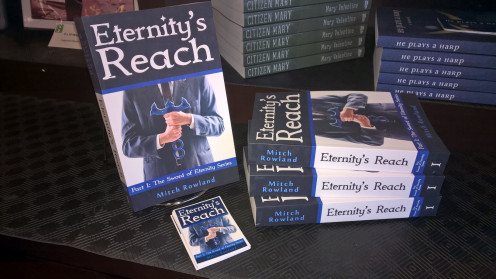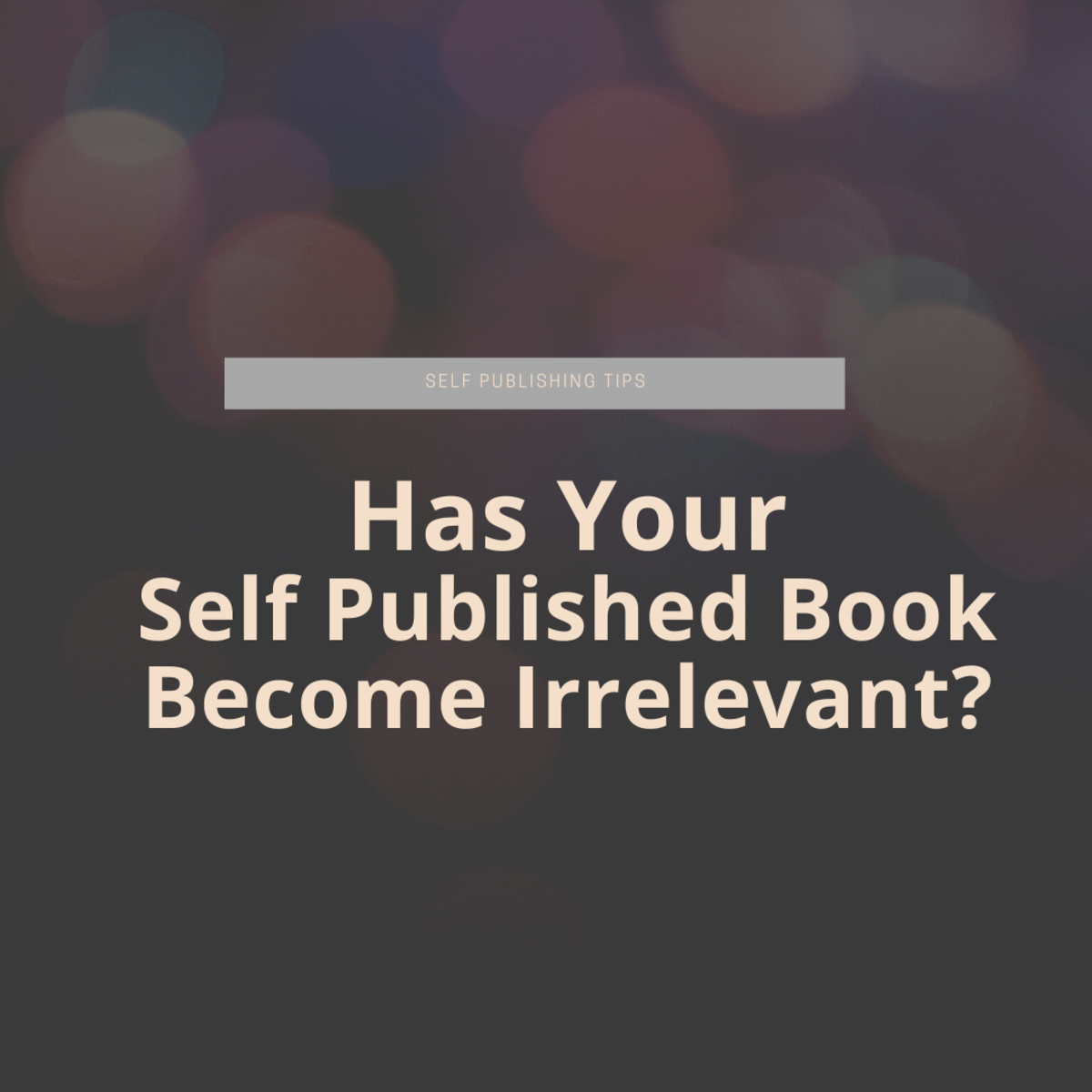- HubPages»
- Books, Literature, and Writing»
- Commercial & Creative Writing»
- Making Money as a Writer
Ways to Market Your Self Published Book

So you’ve written a book and self published it. Now what? While all of us would love the cash to start flowing in, all by itself, the reality is that you’ve just become the book’s one and only salesman. Friends and family are helpful, but no one knows your book like you do, and no one is as invested in its future. But, if you’ve spent all of your time learning how to write (and make epub files) then it can seem daunting to turn around and learn how to market a book. Especially if you’re as introverted as I am. Being boisterous, personable, and self-congratulatory just isn’t something I’m good at. My first instinct, when someone learns I’ve written a book, is to deflect and redirect the conversation because ‘they don’t want to hear me drone on about it’. Dispelling that mentality is a battle in and of itself, but the purpose of this article is to highlight some avenues for your self-published book. Despite the fact that it didn’t catch the eye of literary agents or publishers, that doesn’t mean you can’t still catch the eye of readers. And, while none of these methods are foolproof, they serve as more opportunities to help you realize your dream.
Note: Some suggestions apply only to ebooks and others only to print books (I recommend that you have both versions). And, if you’re looking for a different part of the self publishing process, please refer to my ultimate guide to getting published.
Actively post on social media (Facebook, Twitter, Tumblr, etc.)
Social media, for a lot of people, is going to be the first resource for advertising your new book. Chances are good that you’re already a member of one, but if you’re not, it is a good idea to make a page now. This gets the information out to people who (hopefully) like you and are likely to share it and tell others. Depending on how active you are on these websites, it may not be a boon. But posting regular updates can be healthy for you as well, because it frames your passion as a career, rather than a hobby. And it does help to stay active by sharing relevant articles and appropriate memes. This will encourage more people to follow you than it would if all you ever post is stuff about your book.
It may also be a good idea to utilize artistic websites. Places like deviant art provide a vast community of artists where you can share your book cover, promotional images, and even excerpts from your book.
Make business cards and swag.
Printing business cards should be very high on your priority list. If your book is digital, then this is the only way for someone to take your information with them. But, even if you have physical copies of your book, you can’t carry them around in your pocket. Business cards are the perfect way to get all pertinent information across in a compact space. For mine, I included the book’s cover on one side, and a description on the other side. Try not to clog up the back with text. But, in general, include things like your personal website and places where the book is available. Business cards can be obtained from printing websites, or you can make your own using Microsoft publisher and cardstock.
And, by swag, I mean you can also print t-shirts, messenger bags, and bumper stickers (to name a few) from sites like café press. This helps you advertise your book, just by walking around.
Check local coffee shops and bookstores to see if they feature local authors.
A lot of your big-name bookstores do not carry self published books. Or, at least, they say they don’t. Realistically, if they get enough requests for any book, they will find a way to carry it. But I’ve found that local book stores (and some coffee shops) are actively seeking local authors to display in their shops. This helps the business have a ‘homey’ feel, while promoting community writers. Sometimes it’s obvious which ones participate in this practice, but it never hurts to ask. Most will do it on a consignment basis, taking a percentage of each sale, which is preferable over up-front costs for advertising space.
Search for bulletin boards in local businesses to see if you can post your business cards.
Many local businesses have bulletin boards posted in their shops for community events and services. Often times, all you have to do is ask, and they will let you post some of your business cards. Just make sure that you do ask, because these boards are often reserved for non-profit events only. Posting your cards without permission might make employees angry, which is counterproductive to your cause. This also goes for placing your card in places you know it shouldn’t be, like on the shelves at a bookstore. This just gives the impression of a writer who is trying to cheat the system, and they are often discarded without a second look.
Rent a booth at a local craft fair or convention.
Depending on how much money you have to invest into your passion, you might consider renting out a booth (or floor space) at a local craft show or convention. Having an author there to sign the books they are selling can be quite appealing, especially in their hometown. The genre of your book will also play into which venue is more successful. For example, if you write fantasy or science fiction, a convention will probably get you more attention than a craft fair. Whereas a mystery or a romance, might have the opposite results. Research the type of audience that attends that event and you’ll get an idea if it’s right for your book.
Distribute copies of your book into free little libraries.
This option can seem unappealing because it’s essentially giving away free copies of your book that may or may not ever be read. But free little libraries are a neat, 24/7 method of getting books directly to readers. The people who stop to look at these are the people who actively read. And, while your book might sit there for a while, most little libraries have viewing windows, which means your book is on display that whole time. As a side note, I don’t recommend signing the copy you leave here. Simply because a signed copy of a book will encourage someone to keep it, rather than returning it to the little library for someone else to read. With this method, your goal is to get as many people to read it, and talk about it, as possible.

Make an author website as well as an official social media page.
The idea here is that you want your readers to have a place to go, where they can find other works you’ve done, or check back for new projects. A website is good because it gives you a professional platform from which to present yourself (and show up in search engines). You could also tie your author page to some sort of blog or writing website (like HubPages). That way you’re providing original content online, with links back to your books.
And a facebook/twitter/goodreads page allows you to provide real-time updates to people who follow you (and might be interested in that new book). This is also a good place to hold periodic contests, which can engage your readers and give away copies/swag.
Price the ebook low, so it’s an impulse buy, and offer the book for free for 30 days.
Print books have a baseline price they can’t drop below because of paper costs, but there are no such restrictions on ebooks. Which means you can set it as low as you want. If you’re wondering why someone would price an ebook at $0.99 or $1.99 it’s because it effectively turns a risky purchase into an impulse buy. People are reluctant to try out an untested author if the book costs $15.99, but $1.99? Sure, why not? The self publishing market is still changing, but right now those low prices are the going rate. So if you want to compete, you’ll have to set something similar. And it does pay to give away your book for free. Some readers only download free ebooks. So, by offering it free for a set amount of time (like 30 days) you get a bump on the rankings list (because a lot of people are downloading it) and a much higher chance that someone will read it and become a lifelong fan. Admittedly, this method works best if you have more than one book out there, because then people who got the free book will pay for later books. But that’s up to you. In some cases, self published authors, with a lot of books under their belt, will permanently give away their first book for free, in the hopes of snagging potential readers.
Check if local bookstores and libraries will host a book signing event.
Similar to the suggestion above about local stores carrying your book, some will also agree to a book signing event. Basically they put up fliers, then you come in with a bunch of copies and try to sell it yourself. Again, depending on how introverted you are, this might be a horrifying concept. But it’s certainly worth looking into. And, should you decide to go through with it, try not to get discouraged if no one shows up. I read a how-to-write book some time ago where the author experienced something similar. But, rather than get discouraged, he used the time at his empty signing events to write more books. This is your passion, after all.
Paid ads.
Paid advertising can often seem out of reach for self published authors, but not all ads are done on cable television or youtube videos. In fact, Facebook offers an advertising system that targets your demographic and distributes ads based on a set amount of money you give them. I can’t personally speak for the effectiveness of this method, but I do know that I purchased a self published book because of one of those ads. So it is yet another option, should you find yourself with some extra money.

As I said above, none of these methods are foolproof for getting your book noticed. But, as the only salesman for your book, every little effort helps. It can be difficult to juggle marketing and new writing projects, but I think it’s a worthwhile struggle. We pour everything into each writing project, so the continued marketing of old projects is a way to remind yourself of everything you’ve done. Those books may be old news to you, but to every potential reader, it’s brand new. So never stop trying to get it to them.







